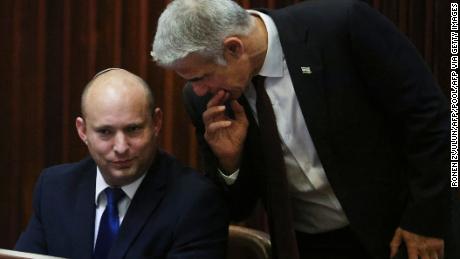What you need to know about Israel’s new Prime Minister
Having failed to cross the electoral threshold in the first election in April 2019, his right-wing party had a mere seven seats following the latest election.
And yet Bennett is now Israel’s Prime Minister.
“Twice in history, we have lost our national home precisely because the leaders of the generation were not able to sit with one and another and compromise. Each was right, yet with all their being right, they burnt the house down on top of us,” Bennett said in a speech before his swearing in. “I am proud of the ability to sit together with people with very different views from my own.”
Now Bennett will hold the country’s top job for two years, before handing over to Lapid.
The two men’s partnership is an unlikely one, and Bennett will sit alongside politicians with completely opposing ideologies to his own in government. But as Lapid and Bennett sat next to each other in the government’s first cabinet meeting late Sunday night, Lapid said it was based on mutual trust and friendship.
The two formed a political brotherhood in 2013, and it has re-emerged to lead the country into a new era of politics.
Bennett lies to the ideological right of Netanyahu in several crucial areas and carries into office a history of incendiary remarks about Palestinians and a well-documented ambition to annex part of the occupied West Bank.
How much of his agenda Bennett can achieve while constrained in an awkwardly assembled coalition remains to be seen. But the Yamina leader — for so long a supporting character in Israel’s high-stakes political spectacle — is placed to become a major player on the world scene.
Staunch critic of two-state solution
Born in Haifa to immigrants from San Francisco, Bennett served in an elite unit of the Israel Defense Forces, before studying law at Hebrew University. He then became an entrepreneur, launching a tech start-up in 1999 which he later sold for $145 million.
He entered Israeli politics under Netanyahu’s wing years later, though the two fell out after he was dismissed as chief of staff in 2008.
Bennett made his own name nationally in 2013 as the leader of the pro-settler party Jewish Home, making his desire to prevent the formation of a Palestinian state a central plank of his pitch to voters. After a merger with another party, he rebranded the party “Yamina” in 2019.
Bennett held several posts in Netanyahu’s various governments, including as minister of defense, while continuing to outflank Netanyahu on issues relating to the Palestinian territories.
He has consistently held firm to his opposition to a two-state resolution since then, citing security and ideological concerns.
The international community, including the United States, is pushing for the renewal of a peace process between the Israelis and Palestinians, but this government is ill-equipped to handle such negotiations, since two of the parties are vocally opposed to the establishment of a Palestinian state.
During the most recent conflict between Israel and Hamas-led militants in Gaza, Bennett said the Palestinians could have turned Gaza “into a paradise.”
“They decided to turn it into a terrorist state,” Bennett told CNN’s Becky Anderson last month, before a ceasefire was agreed. “The moment they decide that they don’t want to annihilate us, this all ends.”
Unlikely bedfellows
Bennett has railed against government regulation of the private sector and labor unions.
Bennett has become a right-wing thorn in Netanyahu’s side, fiercely criticizing his handling of the pandemic as well as the country’s interminable political deadlock.
Bennett told CNN last month that, compared to his time in the tech sector and in the military, Israel’s politics was “quite a mess.”
Bennett’s government will focus on domestic issues during his two years as prime minister, before he hands the reins to Lapid according to their coalition agreement.
These will include the relationship between religion and state, the cost of living, and quality of life issues. Israel also has not passed a budget since March 2018; the newly anointed government has three months to enact one or the Knesset will automatically dissolve and the country will once again head to an election.
He will be watched closely by a familiar foe. Netanyahu, once considered a “magician” of the country’s political scene, warned during Sunday’s swearing-in debate that he would remain a force in Parliament. “We’ll be back soon,” he told lawmakers, after claiming that the new government would not stand up to Iran.
How much of his personal ideology Bennett can now enact as prime minister is an open question, but he has already made clear that compromise will form an important part of the government’s ability to function.
“The government that will be formed represents many of Israel’s citizens: from Ofra to Tel Aviv, from Rahat to Kiryat Shmona. Precisely here lies the opportunity,” Bennett said on Sunday. “Our principle is: We will sit together, and we will forge forward on that which we agree — and there is much we agree on, transport, education and so on — and what separates us, we will leave to the side.”
![]()






